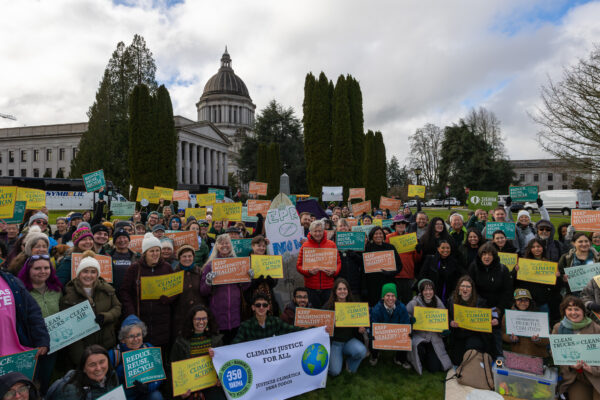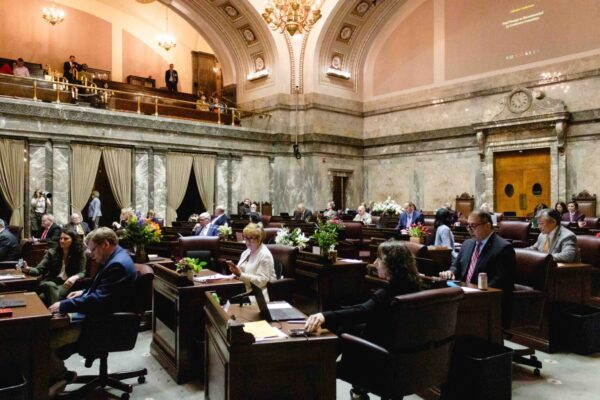*** FOR IMMEDIATE RELEASE *** APRIL 23, 2021
MEDIA CONTACTS:
Zachary DeWolf, Washington Environmental Council/Washington Conservation Voters, 206-631-2629
OLYMPIA, WA–Just tonight, after months of intense work and negotiations, the Washington State House of Representatives passed Senate Bill 5126, Climate Commitment Act, by a vote of 54-43. Passage of this historic climate legislation puts Washington on the path to establishing the most comprehensive carbon pricing program in the nation, capping toxic greenhouse gas emissions at a critical time in the climate emergency.
“Today, I want to honor and thank my teachers and heroes, Quinault President Joe DeLaCruz and Nisqually visionary Billy Frank Jr., for laying the groundwork for us to reach this day — the day the Washington State House of Representatives finally boldly confronted the existential threat of climate change,” said Fawn Sharp, President of the National Congress of American Indians and Vice President of Quinault Indian Nation. “Our collective spirit soars for the ancestors whose example we have finally heeded, and for our youth and children who deserve to live in this beautiful and blessed land the way the Creator intended it.”
“Indigenous Peoples, Black people, and Communities of Color have always led with vision and solutions to heal our planet with justice,” said Sakara Remmu, lead strategist for the Washington Black Lives Matter Alliance. “We have to. Our lives depend on it. We stand with the Puyallup Tribe, Tulalip Tribe, Yakama Nation and other partners to support and improve 5126 as one mechanism for progress for people most impacted by climate change.”
The Climate Commitment Act is the culmination of more than a decade of advocacy, coalition building, and lessons learned from California to put a price on carbon, reduce greenhouse gas emissions, and establish direct benefits to communities most impacted by the climate crisis. This bill includes requirements to address air pollution and contaminants, prioritize investments in Tribal Nations and in overburdened communities from the revenue of the program, and integrate leadership from Tribal Nations and overburdened communities into the oversight and management of the program.
“When carbon pricing bills were first proposed this year, Washington Environmental Council got to work listening to Tribal Nations, Black-led movement groups, and overburdened communities in order to strengthen and pass a strong carbon pricing policy that met their needs and the goals of our state,’ said Alyssa Macy, CEO of Washington Environmental Council/Washington Conservation Voters. “Future generations will look back at this moment and know that we valued their futures by passing the Climate Commitment Act. I commend the Washington Legislature, Representative Fitzgibbon, and Governor Inslee for keeping their promise to act boldly on climate this year.”
“The year 2020 was the warmest year on record, and we also saw the worst wildfires on record. Every year, we see more and more impacts of climate change. After more than a decade of debate, scrutiny, and delay, we couldn’t wait any longer,” said Representative Joe Fitzgibbon (D, 34th District). “We listened to communities across the state, Tribal Nations, and environmental leaders to develop the strongest carbon pricing policy in the nation, the Climate Commitment Act, which will cap and reduce pollution that harms our health and jeopardizes our future–seizing this once-in-a-generation opportunity to pass this landmark bill into law.”
This bill now moves back to the Senate for concurrence and onto the Governor’s desk.
Senate Bill 5126, the Climate Commitment Act, overview:
The Climate Commitment Act establishes a declining emission cap on eligible industries tied to our state’s greenhouse gas emission limits of net-zero by 2050 and creates an auction for compliance allowances, with each allowance allowing up to one metric ton of ghg emissions. The bill strengthens the regulatory authority to address criteria pollutants (e.g. particulates, sulfur dioxides, and nitrogen dioxides) through enforceable air quality targets and a required monitoring program. The carbon pricing program allows for verifiable and certified offsets, along with specific investments to enable tribal offset projects.
The program utilizes the newly established Environmental Justice Panel through the passed HEAL Act (SB 5141) with 2 additional tribal representatives to provide oversight and management of the program. And, establishes 3 primary investment accounts to transition towards a clean energy economy and natural climate solutions and resiliency:
1) Carbon Emission Reduction Account to invest in reducing carbon emissions from the transportation sector;
2) Climate Investment Account that invests in both a ‘Climate Commitment Account’ for emission reduction approaches and a ‘Natural Solutions Account’ that invests in natural climate solutions. Total investments through these accounts are required to have at least 35% go to direct and meaningful benefits to vulnerable populations and at least 10% for projects formally supported by an Indian Tribe; and
3) Air Quality and Health Disparities Improvement Account to improve air quality through reduction of criteria pollutants, fund monitoring, and reduce health disparities.
Finally, this bill establishes a comprehensive climate governance structure to enable complementary climate action moving forward.
###



